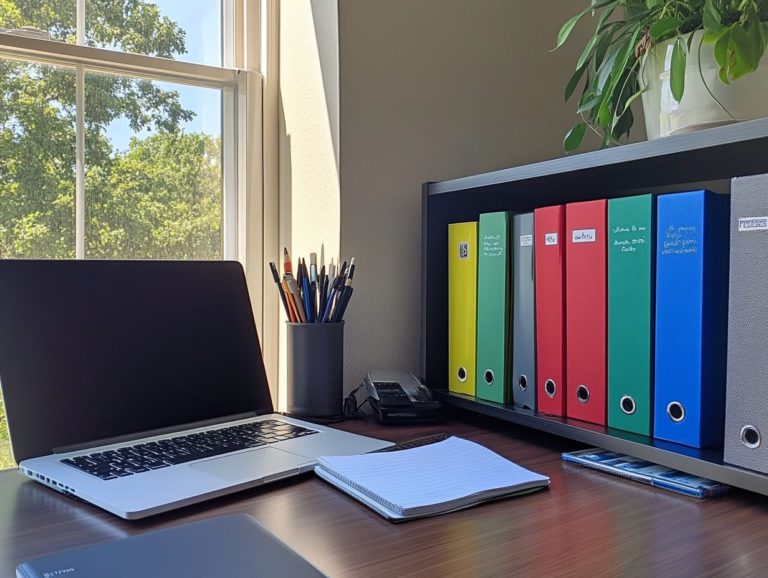how to manage time effectively during exams
Exams can feel overwhelming. Mastering time management can boost your academic performance significantly.
This article explores the importance of managing your time effectively during exams. It highlights common mistakes to avoid and offers practical strategies for creating study schedules and prioritizing tasks.
You will find tips for maintaining focus on exam day and handling unexpected time constraints with ease. Get ready to transform your exam experience!
Contents
- Key Takeaways:
- Understanding the Importance of Time Management During Exams
- Common Time Management Mistakes During Exams
- Effective Time Management Strategies for Exams
- Managing Time During Exam Day
- Dealing with Unexpected Time Constraints
- Frequently Asked Questions
- What are some tips for effectively managing time during exams?
- How can I prioritize my time effectively during exams?
- What are some common time management mistakes to avoid during exams?
- How can I stay motivated and productive while managing my time during exams?
- How can I effectively manage my time during exams if I have multiple tests on the same day?
- What can I do if I feel like I am running out of time to study for exams?
Key Takeaways:

- Effective time management can greatly impact your academic performance.
- Avoiding common time management mistakes improves study efficiency.
- Creating a study schedule and prioritizing tasks are key strategies.
Understanding the Importance of Time Management During Exams
Effective time management during exams is essential, especially when aiming to optimize your academic performance in high-stakes situations like the LSAT or other university-level assessments.
Mastering this skill enhances your exam preparation, builds your confidence, and alleviates nervousness.
By applying effective time allocation strategies, you can navigate your study techniques more efficiently. This leads to improved knowledge retention and better performance outcomes.
Impact on Academic Performance
Effective time management boosts your academic performance. It directly influences how well you prepare for exams and review answers under pressure.
Structured schedules allow you to set aside specific blocks of time for focused study sessions, enabling deeper engagement with the material.
Breaking subjects into manageable segments helps you utilize study materials efficiently, ensuring that no topic is overlooked.
Ultimately, mastering time management enhances your comprehension and reduces anxiety, resulting in more confident performance during assessments.
Common Time Management Mistakes During Exams
Identifying and rectifying common time management mistakes is crucial for effective exam preparation. This can significantly alleviate stress during the actual test.
Many students underestimate the importance of allocating time wisely across various exam questions, often leading to rushed responses and poor performance.
By prioritizing tasks and strategically planning breaks, you can maintain focus and enhance your overall exam experience.
How to Avoid Common Mistakes
Steering clear of common time management mistakes can elevate your performance during exams, allowing you to approach each question with greater focus.
Recognizing pitfalls like poor time allocation and skipping necessary breaks helps you develop strategies that optimize your study routine.
It’s crucial to set specific time blocks for each subject to prevent the dreaded last-minute cramming.
Incorporating short, regular breaks during study sessions keeps your energy levels up and enhances retention by allowing your brain to recharge.
Techniques like the Pomodoro Technique, which alternates focused work intervals with brief breaks, can remarkably boost your productivity.
By cultivating these habits, you can streamline your study techniques, paving the way for improved preparation and reduced stress come exam day.
Effective Time Management Strategies for Exams

Developing effective time management strategies is crucial for your successful exam preparation. These strategies can significantly enhance your overall study habits.
By establishing a structured routine with a well-crafted study schedule, you can allocate your time effectively across different subjects. Utilize diverse study techniques to elevate your learning outcomes.
Incorporating time allocation strategies helps alleviate stress. This leads to better revision and practice.
Creating a Study Schedule
Creating a study schedule is essential for effective time management as you prepare for exams. It serves as your blueprint for academic success.
A well-structured plan outlines your study topics and propels you toward mastering the material efficiently.
Begin by setting realistic goals that reflect the volume of content you need to cover. Align these goals with your personal study pace.
You must allocate your time wisely across subjects to succeed. Ensure you dedicate attention to both your stronger and weaker areas.
Don t underestimate the power of regular breaks. These brief pauses can significantly enhance your focus and retention.
The flexibility built into your schedule allows you to adapt to unexpected events. This might mean adjusting priorities or taking necessary rest days.
This strategy makes studying easier and more enjoyable!
Prioritizing Tasks
Prioritizing tasks effectively is essential in time management, particularly during exam preparation. It enables you to concentrate on the most important subjects and topics first.
Employing techniques such as the Eisenhower Matrix helps you prioritize tasks by urgency and importance. By categorizing tasks into four quadrants, you can clearly identify what needs immediate attention and what can be scheduled for later.
Similarly, the ABC prioritization method allows you to pinpoint high-priority items that require your focus right away. Less critical tasks can be delegated or postponed.
By implementing these strategies, you enhance your concentration during study sessions. This reduces procrastination, leading to more efficient and effective learning outcomes.
Utilizing Study Techniques
Utilizing a variety of study techniques can significantly enhance your ability to learn and retain information during exam preparation.
Incorporating practices such as active learning, where you engage deeply with the material, enables you to grasp concepts more thoroughly.
Embracing spaced repetition allows you to revisit information at timed intervals. This boosts your memory retention over time.
When you integrate these methods into a well-structured study schedule, you can break down complex subjects into manageable portions. Employ revision techniques that reinforce your knowledge.
This balanced approach fosters a more comprehensive mastery of the subject matter. Ultimately, it elevates your academic performance to new heights.
Managing Time During Exam Day
Managing your time effectively on exam day is crucial. It ensures you can complete all sections without unnecessary stress. To further enhance your experience, learn how to stay calm during high-stakes exams, as this can significantly influence your performance.
Adopting a strategic approach to time management enhances your focus and boosts your confidence. This enables you to perform at your best, even in high-pressure circumstances.
Tips for Staying Focused and Efficient

Staying focused and efficient during an exam is crucial for optimal time management and can greatly impact your overall performance.
To achieve this, you can employ various strategies that help maintain your attention and reduce anxiety.
- One effective approach is to use a timer, breaking the exam into manageable sections. This way, you can take short breaks between tasks to refresh your mind.
- Practicing deep breathing exercises is another powerful tool; it alleviates stress and fosters a sense of calm.
Creating an environment with minimal distractions is equally vital. Turning off notifications on your devices and finding a quiet space can make all the difference.
Don t underestimate the power of preparation. Being well-prepared instills confidence, allowing you to concentrate better when the exam clock starts ticking.
Dealing with Unexpected Time Constraints
Navigating unexpected time constraints during exams presents a unique challenge. It demands strategic time management and knowing how to revise effectively before an exam to alleviate stress and sustain your performance.
You may often face unforeseen circumstances that disrupt your carefully laid plans. It s crucial to remain adaptable and resourceful under pressure.
Being flexible and adaptable will give you the power to handle the situation with confidence and poise.
Strategies for Handling Time Pressure
Implementing strategies to manage time pressure can significantly elevate your exam performance and bolster your confidence during high-stakes testing moments.
One effective method is to assign specific time budgets for each question. This allows you to maintain focus while minimizing the temptation to linger too long on any single problem.
By breaking the exam into manageable segments, you can easily monitor your progress and adjust your pacing as necessary.
Incorporating deep breathing techniques can help you maintain composure, reduce anxiety, and enhance your concentration. Regularly practicing with timed mock tests practice exams taken under timed conditions familiarizes you with the exam format, enabling you to refine your timing and decision-making skills.
All of these approaches work together to ensure a more successful and rewarding testing experience.
Frequently Asked Questions
What are some tips for effectively managing time during exams?
- Create a study schedule and stick to it. This will help you prioritize your time and ensure you cover all necessary material.
- Break down your studying into smaller chunks. This helps you maintain your energy and focus, ensuring you’re at your best!
- Eliminate distractions, such as social media or unnecessary phone calls, while studying.
- Take regular breaks to avoid fatigue and maintain focus.
- Use study tools like flashcards or practice quizzes to maximize your time and review material efficiently.
- Utilize past exams or practice questions to get a feel for the types of questions that may be asked.
How can I prioritize my time effectively during exams?

- Identify which exams are the most important or have the highest weight in your overall grade.
- Allocate more time to studying for these exams while still giving attention to the others.
- Review material that you struggle with first, as it may require more time and effort.
- Balance your study time between different subjects to avoid becoming overwhelmed.
- Consider seeking help from a tutor or professor for subjects that are particularly challenging.
- Make sure to also prioritize time for self-care and breaks to avoid burnout.
What are some common time management mistakes to avoid during exams?
- Waiting until the last minute to start studying.
- Not setting aside enough time for studying each day.
- Overlooking the importance of breaks and self-care in maintaining focus.
- Becoming too focused on one subject and neglecting others.
- Not utilizing available resources, such as study guides or past exams.
- Allowing distractions, such as social media or unrelated tasks, to take up valuable study time.
How can I stay motivated and productive while managing my time during exams?
1. Set specific and achievable goals for each study session.
2. Reward yourself after completing tasks or achieving goals to stay excited and motivated!
3. Surround yourself with a study group or supportive peers who can keep you accountable.
4. Take breaks and do things that help you relax and destress.
5. Stay organized by using a planner or to-do list to prioritize and track your progress.
6. Remember the end goal and why doing well on exams is essential for your academic success.
How can I effectively manage my time during exams if I have multiple tests on the same day?
1. Start studying now to avoid last-minute panic on exam day.
2. Prioritize which exams need the most attention and allocate your time effectively.
3. Break up your studying into shorter, focused sessions for each exam.
4. Use any review materials provided by your teachers or professors.
5. Practice good time management and get enough rest leading up to exam day.
6. Don t hesitate to ask for help or clarification from your teachers or classmates if needed.
What can I do if I feel like I am running out of time to study for exams?
1. Focus on the most important topics or chapters first.
2. Study in shorter, more concentrated sessions instead of cramming everything at once.
3. Use study aids tools that can help you learn, like flashcards and quizzes to review quickly and efficiently.
4. Get a good night’s sleep before the exam, as being well-rested can enhance your performance.
5. Talk to your teachers or professors if you feel overwhelmed; see if any accommodations can be made.
6. Remember, it’s better to have some time to study than none at all, so use your available time wisely and focus on the crucial material.






